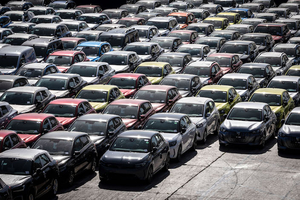BMW Turns to Chinese Smart Driving Expertise to Regain Market Ground
Listen to the full version

As foreign automakers struggle to keep pace in China’s fast-evolving electric vehicle (EV) and smart car market, companies such as BMW are turning to top Chinese tech firms to stay in the race.
BMW has signed a partnership with autonomous driving startup Momenta to co-develop advanced driver-assistance systems for its next-generation China-built models, which are due to launch in 2026.

Unlock exclusive discounts with a Caixin group subscription — ideal for teams and organizations.
Subscribe to both Caixin Global and The Wall Street Journal — for the price of one.
- DIGEST HUB
- BMW partnered with Chinese tech firms, including Momenta, Huawei, and Alibaba, to co-develop advanced driver-assistance systems and AI solutions for China-built models launching in 2026.
- BMW's China sales dropped 15.5% year-on-year to 317,000 units in H1 2025, with its market share declining by about 5 percentage points.
- Chinese brands now control nearly 70% of China’s passenger car market, up 6.6 points from last year, intensifying competition for foreign automakers.
- BMW
- BMW, a German car manufacturer, is actively adapting its strategy in China's rapidly evolving EV and smart car market. To stay competitive, BMW is collaborating with Chinese tech firms like Momenta for advanced driver-assistance systems, Huawei for its HarmonyOS ecosystem, and Alibaba for AI engine development. These partnerships aim to address BMW's declining sales and market share in China, its largest market, where domestic brands are leading in EV and smart car innovation.
- Momenta
- Momenta is a Chinese autonomous driving startup. BMW has partnered with Momenta to co-develop advanced driver-assistance systems for its China-built models launching in 2026. Momenta's solutions are also integrated into vehicles from Mercedes-Benz and Nissan, with over 130 mass-produced models using their technology.
- Huawei Technologies Co. Ltd.
- Huawei Technologies Co. Ltd. is a Chinese tech firm. BMW has collaborated with Huawei to integrate its HarmonyOS ecosystem into BMW's next-generation China-built models, launching in 2026. This partnership is part of BMW's strategy to adapt to China's fast-evolving EV and smart car market.
- Alibaba Group
- Alibaba Group is a Chinese tech firm collaborating with BMW. BMW announced a partnership with Alibaba Group to develop an AI engine based on Alibaba's Tongyi large language model. This collaboration aims to help BMW enhance its next-generation China-built models.
- Mercedes-Benz
- Mercedes-Benz is mentioned in the article as one of the international automakers leveraging China's tech ecosystem. Along with BMW and Nissan, Mercedes-Benz has integrated Momenta's autonomous driving solutions into more than 130 of its mass-produced vehicle models. The article notes that luxury brands like Mercedes-Benz and BMW have been perceived as lagging in China's competitive EV market regarding AI-powered driving and cockpit experiences.
- Nissan
- The provided article mentions Nissan as one of the international automakers that has partnered with Momenta, an autonomous driving startup. This collaboration allows Nissan to integrate Momenta's autonomous driving solutions into its vehicle models, reflecting a broader trend among global carmakers leveraging China's tech ecosystem to remain competitive in the region.
- 2024:
- BMW's global sales remained relatively flat compared with the same period in 2024.
- 2024:
- Chinese brands’ share of the country’s passenger car market increased by 6.6 percentage points year-on-year to nearly 70% (as of 2025).
- 2025:
- Gong Min, UBS’s Head of China Auto Research, commented on foreign carmakers’ transformation needs at the 2025 Shanghai Auto Show.
- Earlier in 2025:
- BMW announced collaborations with Huawei Technologies Co. Ltd. and Alibaba Group, including integrating HarmonyOS and developing an AI engine based on Tongyi LLM.
- First half of 2025:
- China accounted for more than one in four of BMW’s global sales; BMW's sales in China fell 15.5% year-on-year to 317,000 units.
- PODCAST
- MOST POPULAR






